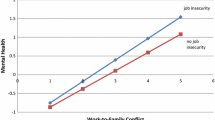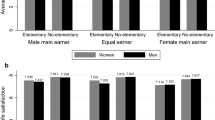Abstract
Purpose
Low income is considered a possible determinant of presenteeism, explained by poor working and living conditions, increased levels of uncertainties and anxiety, and poor health status. We aimed to examine the association between low income and presenteeism by gender and to explain their association using different mediators.
Methods
A total of 14,299 employees aged 18–65 from the 6th BIBB/BAuA Employment Survey 2012 were used, and mediation analyses with inverse odds weighting stratified by gender were conducted.
Results
Low income was significantly associated with presenteeism for men at a significant level of α < .05 (β: 0.376; 95%-CI 0.148–0.604) and for women at a significant level of α < .10 (β: 0.120; 95%-CI − 0.015–0.255). The total effect (TE) was fully and significantly mediated for women when all mediator-weights were considered, whereas for men the consideration of single mediator-weights led to a full and significant mediation of the association between low income and presenteeism. Self-rated health status and income satisfaction contributed the most to the differences in presenteeism by low income with a proportion mediated of 96.3% (men) and 169.2% (women) for self-rated health and 101.6% (men) and 162.5% (women) for income satisfaction.
Discussion
The results indicated a strong association between low income and presenteeism, in particular for men. Self-rated health and income satisfaction were the most important mediators of this association. The results underline not only the relevance of occupational health management and preventive measures, but also the need of a public debate about employment traditions, possibly resulting in role conflicts among men, and wage equality to prevent presenteeism of low-income earners.


Similar content being viewed by others
Data availability
All data are available for scientific use on the website: https://www.bibb.de/de/2815.php. The analytic scripts in Stata are available from the corresponding author upon reasonable request.
References
Andreß H-J, Lohmann H (eds) (2008) The working poor in Europe: Employment, poverty and globalisation. Edward Elgar, Cheltenham
Aronsson G, Gustafsson K (2005) Sickness presenteeism: prevalence, attendance-pressure factors, and an outline of a model for research. J Occup Environ Med 47(9):958–966. https://doi.org/10.1097/01.jom.0000177219.75677.17
Artazcoz L, Borrell C, Cortès I, Escribà-Agüir V, Cascant L (2007) Occupational epidemiology and work related inequalities in health: a gender perspective for two complementary approaches to work and health research. J Epidemiol Community Health 61(2):39–45. https://doi.org/10.1136/jech.2007.059774
Benach J, Vives A, Amable M, Vanroelen C, Tarafa G, Muntaner C (2014) Precarious employment: understanding an emerging social determinant of health. Annu Rev Public Health 35:229–253. https://doi.org/10.1146/annurev-publhealth-032013-182500
Bergström G, Bodin L, Hagberg J, Aronsson G, Josephson M (2009a) Sickness presenteeism today, sickness absenteeism tomorrow? A prospective study on sickness presenteeism and future sickness absenteeism. J Occup Environ Med 51(6):629–638. https://doi.org/10.1097/JOM.0b013e3181a8281b
Bergström G, Bodin L, Hagberg J, Lindh T, Aronsson G, Josephson M (2009b) Does sickness presenteeism have an impact on future general health? Int Arch Occup Environ Health 82(10):1179–1190. https://doi.org/10.1007/s00420-009-0433-6
Bosch G, Weinkopf C (2008) Low-Wage Work in Germany. In: Weinkopf C (ed) The Russell Sage Foundation case studies of job quality in advanced economies Russell Sage Foundation Project MUSE. Baltimore, New York
Cancelliere C, Cassidy JD, Ammendolia C, Côté P (2011) Are workplace health promotion programs effective at improving presenteeism in workers? A systematic review and best evidence synthesis of the literature. BMC Publ Health 11:395. https://doi.org/10.1186/1471-2458-11-395
Cho Y-S, Park JB, Lee K-J, Min K-B, Baek C-I (2016) The association between Korean workers’ presenteeism and psychosocial factors within workplaces. Ann Occup Environ Med 28(1):41. https://doi.org/10.1186/s40557-016-0124-1
Ferrer-i-Carbonell A, van Praag BM (2003) Income Satisfaction Inequality and its Causes. J Eco Ineq 1(2):107–127. https://doi.org/10.1023/A:1026109706836
Gellert FJ, Kesselmann M, Wilke CB (2018) Arbeitswelt Im Wandel. Präv Gesundheitsf 13(1):12–17. https://doi.org/10.1007/s11553-017-0611-4
Gießelmann M, Lohmann H (2008) The different roles of low-wage work in Germany: regional, demographical and temporal variances in the poverty risk of low-paid workers. In: Andreß H-J, Lohmann H (eds) The working poor in Europe: Employment, poverty and globalisation. Edward Elgar, Cheltenham, pp 96–123
Gray BJ, Grey C, Hookway A, Homolova L, Davies AR (2021) Differences in the impact of precarious employment on health across population subgroups: a scoping review. Perspect Public Health 141(1):37–49. https://doi.org/10.1177/1757913920971333
Hall A, Tiemann M (2015) BIBB/BAuA-Erwerbstätigenbefragung 2012: Arbeit und Beruf im Wandel. Erwerb und Verwertung beruflicher Qualifikationen, Bonn
Hunt J (1999) Has work-sharing worked in germany? Q J Econ 114(1):117–148. https://doi.org/10.1162/003355399555963
Johansen V, Aronsson G, Marklund S (2014) Positive and negative reasons for sickness presenteeism in Norway and Sweden: a cross-sectional survey. BMJ Open 4(2):e004123. https://doi.org/10.1136/bmjopen-2013-004123
Johns G (2010) Presenteeism in the workplace: a review and research agenda. J Organiz Behav 31(4):519–542. https://doi.org/10.1002/job.630
Karanika-Murray M, Biron C (2020) The health-performance framework of presenteeism: towards understanding an adaptive behaviour. Human Relations 73(2):242–261. https://doi.org/10.1177/0018726719827081
Karanika-Murray M, Cooper CL (2018) Presenteeism: an introduction to a prevailing global phenomenon. In: Cooper CL, Lu L (eds) Presenteeism at Work. Cambridge University Press, pp 9–34
Kim Y, Park J, Park M (2016) Creating a culture of prevention in occupational safety and health practice. Saf Health Work 7(2):89–96. https://doi.org/10.1016/j.shaw.2016.02.002
Knani M, Biron C, Fournier P-S (2018) Presenteeism: a critical review of the literature. In: Cooper CL, Lu L (eds) Presenteeism at Work. Cambridge University Press, pp 35–68
Lohaus D, Habermann W (2018) Kosten von Präsentismus. In: Lohaus D, Habermann W (eds) Präsentismus. Springer, Berlin Heidelberg, Berlin, Heidelberg, pp 131–160
Marklund S, Gustafsson K, Bergström G, Leineweber C (2021) Reasons for presenteeism in different occupational branches in Sweden: a population based cross-sectional study. Int Arch Occup Environ Health 94(6):1385–1395. https://doi.org/10.1007/s00420-021-01701-2
Miraglia M, Johns G (2016) Going to work ill: A meta-analysis of the correlates of presenteeism and a dual-path model. J Occup Health Psychol 21(3):261–283. https://doi.org/10.1037/ocp0000015
Navarro A, Salas-Nicás S, Moncada S, Llorens C, Molinero-Ruiz E (2018) Prevalence, associated factors and reasons for sickness presenteeism: a cross-sectional nationally representative study of salaried workers in Spain. BMJ Open 8(7):e021212. https://doi.org/10.1136/bmjopen-2017-021212
Nguyen QC, Osypuk TL, Schmidt NM, Glymour MM, Tchetgen Tchetgen EJ (2015) Practical guidance for conducting mediation analysis with multiple mediators using inverse odds ratio weighting. Am J Epidemiol 181(5):349–356. https://doi.org/10.1093/aje/kwu278
Pförtner T-K, Demirer I (2022) How working conditions, socioeconomic insecurity, and behavior-related factors mediate the association between working poverty and health in Germany. Int J Public Health 67:1604555. https://doi.org/10.3389/ijph.2022.1604555
Pförtner T-K, Pfaff H, Hower KI (2019) Trends in the association of different forms of precarious employment and self-rated health in Germany an analysis with the german socio-economic panel between 1995 and 2015. J Epidemiol Community Health 73(11):1002–1011. https://doi.org/10.1136/jech-2018-211933
Pförtner T-K, Pfaff H, Elgar FJ (2022) Dualized labor market and polarized health: a longitudinal perspective on the association between precarious employment and mental and physical health in Germany. J Health Soc Behav 63:357. https://doi.org/10.1177/00221465211066855
Prater T, Smith K (2011) Underlying factors contributing to presenteeism and absenteeism. J Bus Econ 9(6):1. https://doi.org/10.19030/jber.v9i6.4374
Reimer K (2009) Bootstrapping und andere Resampling-Methoden. In: Albers S, Klapper D, Konradt U, Walter A, Wolf J (eds) Methodik der empirischen Forschung. Gabler Verlag, Wiesbaden, pp 521–536
Rohrbach-Schmidt D, Hall A (2013) BIBB/BAuA Employment Survey 2012. BIBB-FDZ Data and Methodological Reports, Bonn
Schmidt K, Pförtner T-K (2020) Job insecurity, sickness presenteeism and the moderating effect of workplace health promotion. J Occup Environ Med 62(11):937–942. https://doi.org/10.1097/JOM.0000000000001997
Sinß F, Preisendörfer P (2020) Bildung, gesundheit und präsentismus. Wirtschaftspsychologie 1:55–62
Susser P, Ziebarth NR (2016) Profiling the US sick leave landscape: presenteeism among females. Health Serv Res 51(6):2305–2317. https://doi.org/10.1111/1475-6773.12471
Tchetgen Tchetgen EJ (2013) Inverse odds ratio-weighted estimation for causal mediation analysis. Stat Med 32(26):4567–4580. https://doi.org/10.1002/sim.5864
Trappe H, Pollmann-Schult M, Schmitt C (2015) The rise and decline of the male breadwinner model: institutional underpinnings and future expectations. Eur Sociol Rev 31(2):230–242. https://doi.org/10.1093/esr/jcv015
Utzet M, Valero E, Mosquera I, Martin U (2020) Employment precariousness and mental health, understanding a complex reality: a systematic review. Int J Occup Med Environ Health 33(5):569–598. https://doi.org/10.13075/ijomeh.1896.01553
VanderWeele TJ (2016) Mediation analysis: a practitioner’s guide. Annu Rev Public Health 37:17–32. https://doi.org/10.1146/annurev-publhealth-032315-021402
Wee LH, Yeap LLL, Chan CMH, Wong JE, Jamil NA, Swarna Nantha Y, Siau CS (2019) Anteceding factors predicting absenteeism and presenteeism in urban area in Malaysia. BMC Publ Health 19(4):540. https://doi.org/10.1186/s12889-019-6860-8
Wege N, Angerer P, Li J (2017) Effects of lifetime unemployment experience and job insecurity on two-year risk of physician-diagnosed incident depression in the german working population. Int J Environ Res Public Health 14(8):22. https://doi.org/10.3390/ijerph14080904
Weinkopf C (2009) Germany: precarious employment and the rise of mini-jobs. In: Vosko LF, MacDonald M, Campbell I (eds) Gender and the Contours of Precarious Employment. Routledge, London and NEew York, pp 177–193
Funding
The authors declare that this study received funding from the German Science Foundation (project number: 388147695). The funder was not involved in the study design, collection, analysis, interpretation of data, the writing of this article, or the decision to submit it for publication.
Author information
Authors and Affiliations
Corresponding author
Ethics declarations
Conflict of interest
The authors declare that the research was conducted in the absence of any commercial or financial relationships that could be construed as a potential conflict of interest.
Ethical approval
Ethical approval was not required for the study as the data set is provided by BIBB (Bundesinstitut für Berufsbildung) in anonymized form for scientific use. The data were collected in accordance with the Declaration of Helsinki. Informed consent was obtained from all individual participants included in the study.
Additional information
Publisher's Note
Springer Nature remains neutral with regard to jurisdictional claims in published maps and institutional affiliations.
Rights and permissions
Springer Nature or its licensor (e.g. a society or other partner) holds exclusive rights to this article under a publishing agreement with the author(s) or other rightsholder(s); author self-archiving of the accepted manuscript version of this article is solely governed by the terms of such publishing agreement and applicable law.
About this article
Cite this article
Pförtner, TK., Demirer, I. To what extent do job insecurity, income satisfaction, and self-rated health mediate the association between low income and presenteeism in Germany? A gendered analysis. Int Arch Occup Environ Health 96, 999–1008 (2023). https://doi.org/10.1007/s00420-023-01982-9
Received:
Accepted:
Published:
Issue Date:
DOI: https://doi.org/10.1007/s00420-023-01982-9




